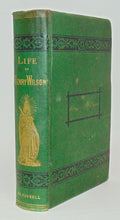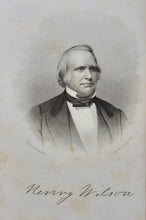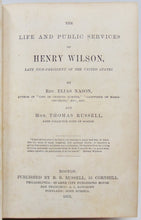Nason, Elias; Russell, Thomas. The Life and Public Services of Henry Wilson, Late Vice-President of the United States. Boston: B. B. Russell, 1876. [9549]
Green cloth decorated in black & gilt, 7 1/4 x 5 inches, steel-engraved frontis portrait, 452 generally clean pp., light tidemark in the long margin towards the end of the book. Very good. Hardcover.
Henry Wilson (1812-1875), b. Farmington, NH; d. Washington, DC. Born into poverty - his father was a War of 1812 veteran and day laborer - at age ten Wilson was indentured to a neighboring farmer. His birth name was Jeremiah Jones Colbath, which he had legally changed at age 21, possibly out of embarrassment of his family's circumstances. Self-educated and industrious, the trials of his youth propelled him, through hard work and business acumen, into learning a trade and becoming a financial success, eventually employing over 100 persons in his own shoe manufacturing company.
He became involved in politics, was seen by his contemporaries as a defender of the "working man," and was at times an advocate of the Whig, Free Soil, Know Nothing, and Republican Parties.
He served in the Massachusetts House of Representatives, and in the State Senate, was active in the State Militia, and was a US Senator from 1855 to 1873, aligning with abolitionists.
In 1861 he recruited and equipped the 22nd Volunteer Infantry, briefly commanding as colonel. As one of few Senators with military experience, his effective service in regard to military affairs was noted.
He served as Grant's Vice-President from 1873 until his death in 1875.
"According to historian George H. Haynes, during his nearly thirty years of public service Wilson practiced principled politics by championing unpopular causes, sometimes at the expense of his personal ambition. The causes Wilson supported included abolition of slavery, and the rights of workers, both black and white." - wikipedia.






